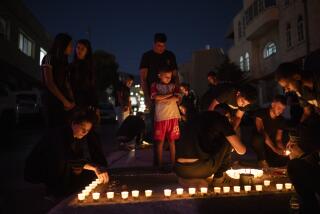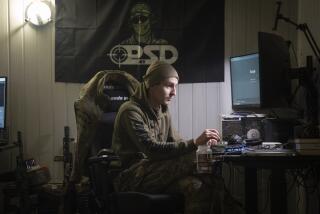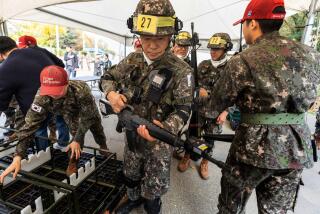1st Cavalry Gears Up for Perilous Scouting Foray Across Border : Military: Moving into enemy territory first, its force will face heavily heavily armed Iraqi units.
- Share via
WITH U.S. FORCES IN SAUDI ARABIA — The Army helicopter pilots gathered in a tent to talk about the difference between fear and terror and prepare their minds for war.
Fear was to be expected, the experienced among them said. It was terror, they said, for which the pilots should be on guard.
“They’ve got apprehensions and concerns, and we talk about it all the time,” said Capt. Mike Karpiak, commander of a helicopter troop in the 1st Cavalry Squadron of the Army’s 1st Armored Division.
The group discussion in a dirt-floored tent on a rainy, bitter day came as the air war over Iraq persisted, and ground forces throughout this armored division prepared their minds, bodies and machines for the massive ground offensive all seemed sure still lies ahead.
This cavalry squadron--a combined helicopter and mechanized ground unit--has one of the most dangerous jobs in the Army: roaming ahead of the rest of the division, looking for the enemy.
The 1st Cavalry is the most decorated in the Army, with a horseback history dating back to 1833 and combat decorations in the Indian wars, the Civil War, World War II and more than half a dozen battles in Vietnam.
Now, in modern warfare, its airborne scouts are positioned on OH-58 observation helicopters with Cobra AH-1 escorts, while their colleagues use Bradley armored fighting vehicles to scout out the terrain by ground.
That means the cavalry is lightly armed compared to the Iraqi armor they would hope to find, and the members of the unit are conscious to the point of the macabre of the dangers they could face.
“In peacetime this is one of the best jobs we have in the Army,” said 2nd Lt. David DeSantas of Buffalo, N.Y., 25, a platoon leader in a Bradley troop. “But when the bullets start flying. . . “
The members of this unit have black pens to ink their blood type to a hatband on the outside of the helmet, a step designed to save a medic the precious seconds he would otherwise need to consult the dog tag inside a wounded soldier’s shirt.
The scout helicopter pilots have a motto: “Unarmed and Unafraid.” An unofficial unit patch designed by members of the troop carries a more morbid message. Bearing a depiction of a burning chopper, it reads: “Recon by suicide.”
“There is an air everywhere I go that has a lot of sobriety to it,” said Lt. Col. Bill Reese, the 40-year-old squadron commander, looking worn and haggard in a chair beneath a tent joining three armored command-and-control vehicles. “This is a very sobering situation.”
“I’ve been very upfront with them,” Reese said, “and I’ve told them this is an outdoor contact sport.”
The colonel and other officers described reconnaissance tactics that call for the cavalry to seek out--spotting but not engaging--enemy troops, then directing heavier forces in for the kill.
“We’d radio back for help,” DeSantas said, “then get out of the way and let our big tanks come in and take care of business.”
“It sounds neat and slick,” Reese said. “But in the fog of war, with smoke and haze and night operations, it’s not so clear. This is mounted warfare, and it happens very quickly, and everything gets mixed up. My goal is to make it more confusing for him than it is for us. And on the offensive, that is normally one of the advantages.”
Reese said he believes the dangers of an American-initiated ground war could be minimized by tactics that he called “the old bully concept--a whole battalion against a platoon.”
“That’s how you destroy him piecemeal, always putting your strength against a weak element that he has.”
In such an attack, he said, the job of the cavalry would be to ask, “Where is his flank, where is that corner that we can start nibbling at? You don’t just start at the middle.”
But, he acknowledged with tightened lips: “We’re going to lose some. We’re just flat going to lose some. Some of these guys are not going to come back.”
Reese, an intense and articulate commander, is among a number of senior Army officers deep in the desert who, in recent days, appeared resigned to the prospect that an extensive ground war will be necessary if the United States is to defeat Iraq.
“While I think the bombing campaign really is going to hurt them, I’ve told my guys very clearly: ‘Don’t think this is going to be a cakewalk where we walk into the country and they’re going to throw their hands up and surrender because we’ve bombarded them into the Stone Age,’ ” Reese said.
Voicing what seems to be a consensus among senior field officers here, the cavalry commander also placed particular emphasis on the importance of defeating Iraq’s Republican Guards, the most elite of Iraqi ground troops.
“We’re going to have to go over there and very calculatedly destroy them,” Reese said of the Republican Guards. “We’re going to have to engage in many battles of direct fire in order to make it so intolerable to him that (Iraqi President Saddam Hussein) will leave (Kuwait) or surrender.”
“What’s it going to take to make that guy give up?” the American lieutenant colonel asked of Hussein. “I think that it’s going to take us going over there and kill them all--kill the right guys anyway.”
More to Read
Sign up for Essential California
The most important California stories and recommendations in your inbox every morning.
You may occasionally receive promotional content from the Los Angeles Times.













